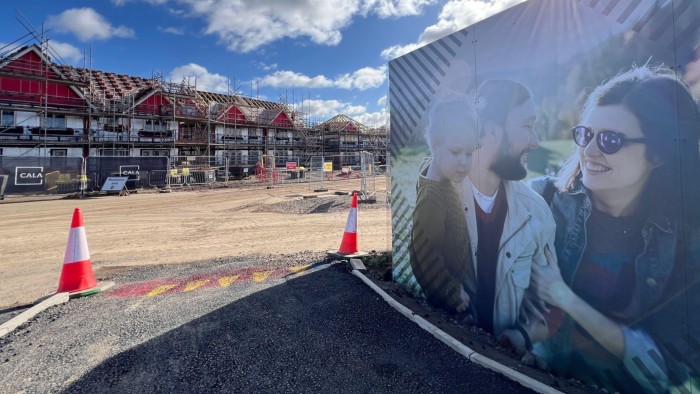Unlock the Editor’s Digest for free
Roula Khalaf, Editor of the FT, selects her favourite stories in this weekly newsletter.
The number of new-build rental homes under construction in Scotland has plunged 26 per cent over the past year, piling further pressure on the SNP as it tries to win back public support ahead of Holyrood elections next year.
In the first quarter of this year, there were 1,896 build-to-rent units under construction, down from 2,545 in the same period a year earlier, according to Scottish Property Federation and Savills data shared with the Financial Times.
England, by contrast, recorded a “far less significant decline” in construction activity over the same timeframe and the number of units submitted for planning rose 6 per cent, raising the prospect of more divergence between Scotland and England and Wales.
The SNP, battered in last year’s general election, is focusing on delivery ahead of elections in May 2026 to sustain its lead against Scottish Labour, which has suffered following Sir Keir Starmer’s difficult first months of government that led to the UK Labour leader’s popularity dwindling.
First Minister John Swinney has pledged to focus on mainstream concerns, such as tackling child poverty and economic growth. More investment into affordable housing has become part of his pitch to voters.
The SPF said Scotland faces property “pipeline exhaustion”, with no new such schemes submitted for planning over the period and the drop-off in on-site activity.
“These figures are the natural consequence of a lack of investor confidence over the last three years in the future of Scotland’s build-to-rent sector as a result of persistent policy uncertainty, especially around rent controls,” said David Melhuish, SPF director.
The Scottish government, which introduced emergency rent caps in September 2022, is passing legislation that would apply permanent controls after temporary measures ended last month.
Limits to rent increases of 3 to 6 per cent ended in March 2024. Over the past year, rent officers have had the power to adjudicate on adjustments to tenancies.
Parliament will next week debate the housing bill, which would introduce long-term rent controls from 2027 following the implementation of secondary legislation.
Industry groups claim the introduction of rent controls has deterred £3bn of investment in build-to-rent schemes that are flourishing south of the border. Governments in England and Wales do not support rent controls.
Permanent curbs would put Scotland at a disadvantage in attracting investment into overall housing stock, they added.
Lesley Gavin of Bocreate, an Edinburgh-based start-up that tracks new-build housing, said there are more than 6,800 build-to-rent homes in Scotland with planning consent that have yet to be built and another 1,900 in the approvals pipeline. That compares with almost 3,450 completed units.
New construction on all homes fell 9 per cent in 2024, according to the latest government statistics. That formed the lowest 12-month figure since 2013, lettings agency DJ Alexander said.
Responding to industry feedback, the Scottish government has tabled amendments to its housing bill, raising rent caps from zero to inflation plus 1 per cent. It is also consulting around an exemption from controls for build-to-rent schemes and more affordable “mid-market rental” homes.
The changes have been criticised by the Scottish Greens, who have warned of above-inflation rent rises during a housing emergency.
People briefed on discussions say the exemptions from rent controls should be recommended after the 12-week consultation period, scheduled to start this month.
Addressing a property conference this month, deputy first minister Kate Forbes conceded the government “needed to get it right” to deliver economic growth.
“Your interest and my interest are aligned on these matters because we want an environment that supports investment,” she said.
Developers are already scoping out potential investments as confidence grows that the sector will be exempted from rent controls, said James Blakey, planning director at developer Moda Group.
Rent control exemptions “would be a significant trigger for investors, such as Moda, to look seriously again at Scotland”, he said.
The Scottish government said: “We recognise that Scotland needs a thriving private rented sector offering good quality, affordable housing options while valuing the benefit that investment in rented property delivers.”
https://www.ft.com/content/348245a9-bba6-4460-bd55-7be65a291dbe


